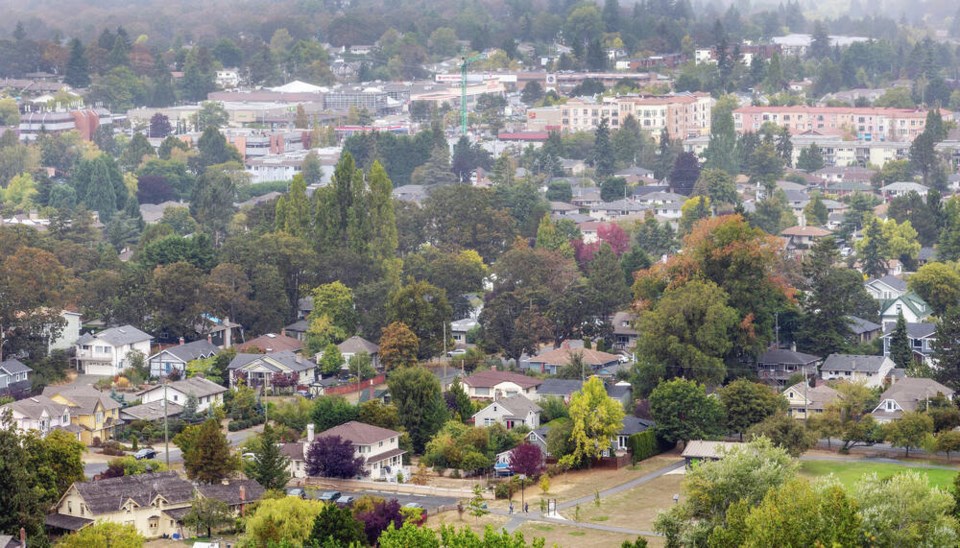UN Secretary General Antonio Guterres stated almost a year ago: “Making peace with nature is the defining task of the 21st century. It must be the top, top priority for everyone, everywhere.”
In my view, this can only happen if we recognize, as Barbara Ward and Rene Dubos’ 1972 book put it, that there is “Only One Earth” and we have to learn to live within and not beyond its bounds.
We are a long way from that. According to the Global Footprint Network, our ecological footprint, globally, was 1.7 planets in 2017, with 61 per cent of that due to carbon emissions.
Here in Canada, it was five planets, of which almost 65 per cent was due to our carbon emissions — and that ignores the emissions from Canada’s exported fossil fuels. So to become a One Planet Canada, we need to reduce our ecological footprint by 80 per cent — and we have to do so quite rapidly.
In this region, our footprint is a bit less, according to the footprint of both Saanich and Victoria as calculated by Dr. Jennie Moore at the B.C. Institute of Technology and Victoria-based environmental consultant Cora Hallsworth. This is largely because 90 per cent of our electricity is from hydro, not fossil fuels, and we have a more temperate climate year-round than most of Canada.
Nonetheless, with a footprint of around three to four planets, we still need to reduce it by 65 to 75 per cent, a massive task that should be “the top, top priority for everyone, everywhere” in the region.
In fact, Saanich — which we tend to forget is the largest municipality by population in the region — has been hosting and supporting a One Planet Saanich initiative since 2018, and Mayor Fred Haynes has been an enthusiastic supporter. The initiative came to Saanich from a U.K.-based organization, Bioregional, as part of a small international project.
Co-ordinated by Cora Hallsworth of Vancouver-based non-profit OneEarth and with funding first from Bioregional and now from Vancity Credit Union and the District of Saanich, the project engages local community organizations, schools and businesses in developing their own One Planet Action Plans and reporting on their progress in reducing their ecological footprint. You can find a number of their plans published in the Stakeholders page on the One Planet Saanich website.
But Saanich itself does not yet have an overarching strategy to become a One Planet municipality, although it does use the One Planet framework as a “lens” within its Climate Action Plan.
In addition, it is now developing a Resilient Saanich initiative — an environmental policy framework that will integrate sustainability and the natural environment — and has other relevant initiatives, such as its Active Transportation Plan.
So I was glad to see Saanich, on Oct. 18, become the first municipality in the region — and, as far as I know, the first in B.C. and indeed in Canada — to start down the path to becoming a One Planet municipality.
This followed a presentation I made earlier in the summer to the council’s Healthy Saanich Advisory Committee, in my capacity as founder and president of Conversations for a One Planet Region. The committee adopted a resolution asking council to develop a One Planet Action Plan. Council adopted the resolution and referred it to staff to report back on next steps.
One way forward would be to create a One Planet Strategy to embed the 10 One Planet principles into all other plans and strategies at the municipality. Saanich could then report its progress using the same One Planet metrics that are currently being developed to create a standard reporting framework for all the One Planet Saanich stakeholders.
What makes these One Planet principles particularly interesting is that they are focused first on people and community. In fact, the first three principles are about health and happiness, equity and local economy, and community and culture. Only then do the principles address the “usual suspects” of environmental sustainability, including, of course, both zero waste and zero-carbon energy.
Saanich is the regional and indeed provincial leader in heeding Mr. Guterres’ call to make peace with nature. Now we just need the rest of the region to get on the same page.
More on that next week.
Dr. Trevor Hancock is a retired professor and senior scholar at the University of Victoria’s School of Public Health and Social Policy.



